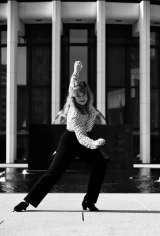Megan Batty (MA’20 Musicology, current MMus Conducting) has seen every side of a choir. She started singing at just five years old and joined Ottawa’s Cantiamo choir soon after. Later, during her BMus and BEd at Queen’s University, she returned as an intern conductor with Cantiamo and worked extensively with their educational engagement programs. And after moving to Montreal, she served as artistic director for longstanding feminist choir Choeur Maha and is now the Interim conductor with Choeur Adleisia.
She’s also an avid swing dancer, and her studies at McGill have combined her passions for dance and music through an embodied, feminist lens. A finalist in the 2022-2023 Research Alive Student Prize, she’ll be presenting her research about Montreal’s buzzing swing-dance scene.
We touched base with Megan about music, dance, and the exciting possibilities of research that connects us to collaboration and community.
What music never fails to transport you?
Swing music – a great swing tune makes me want to dance every time. There are also pieces that allow me to tune out the world and just sit in an emotion every time I hear them, like Piazzola’s “Oblivion,” or Sarah Quartel’s “Lux aeterna.”
What do you hope audiences experience at a Schulich event such as Research Alive?
I hope that audiences feel transported into a world of musical richness, that they make connections between the music they experience and their own lives, and that they come away feeling inspired.
What led you to your Research Alive project?
I was always interested in researching swing music and dance, and my supervisor Dr. Lisa Barg suggested that I develop a project centered around the Montreal swing dance scene since I’m a part of the community here. I started from a place of curiosity and spoke with some members of the community to get their perspectives on the improvised exchanges between musicians and dancers. I’m really grateful that this project allowed me to draw on real life experiences from my informants and my own embodied knowledge as complementary to existing scholarship. It felt like a way to contribute to the growing body of scholarship in a way that foregrounded the experiences of Montreal dancers, DJs and musicians.
What do you believe is a key feature in enabling the best kind of music-making and music-learning experience?
A fundamental feature in the best music-making spaces is trust: trust between the performers that they will support each other while working together to push the boundaries of their artistic practice.
If faced with obstacles or uncertainty, how do you keep moving forward?
When faced with obstacles, I try to take a step back, center myself, then come at the problem from a different angle.
What is exciting to you about your field right now?
I’m always excited to see public-facing initiatives in musicology, like resources that make works by historically underrepresented composers more available, and initiatives like Research Alive.
How do research topics influence or shape the music we make and the world we make music in?
I think research topics provide a focus to deeply engage with specific repertoire or musical practices. In working on a particular topic, we develop not only a better skill set and knowledge base, but we also bring our own unique perspective to the larger conversation.
What about Schulich allows for study and research such as yours?
The connections made with other musicology students who are also using feminist theory and methods to shape their work has been indispensable. Having a supportive community of graduate students and professors has definitely helped make this work possible.
What is currently propelling you in your studies?
What drives me in my current studies is dreaming up projects that allow me to collaborate with other students and artists to explore the deep connections between music and dance.
 Research Alive | Choreomusical conversations
Research Alive | Choreomusical conversations
in Montreal’s swing dance community
March 14, 2023 at 5:00 pm
Attend in person and on line
Discover the Research Alive series
Megan Batty (she/her) is a conductor, singer, and composer. She received an M.A. in musicology from the McGill Schulich School of Music under the supervision of Dr. Lisa Barg. She is the recipient of a SSHRC grant for her research on swing music and dance, and has presented her research as part of DIG musique Québec and IASPM Canada. Her research will also be featured in a forthcoming edition of the SQRM.
She is continuing her studies at Schulich with a Master’s in Choral Conducting under Dr. Jean-Sébastien Vallée and is an active conductor in Montreal, currently serving as the Interim conductor for Choeur Adleisia. Prior positions include the Artistic Director with Choeur Maha (Montreal) and the Associate Conductor for Nipiit Katittut-Voices United 2017 (Ottawa/Iqaluit). She has continued her research in the field of choral conducting, presenting most recently at PODIUM 2022.
Megan has been swing dancing for ten years, attending events in Canada, Europe, and the United States. She particularly enjoys dancing the Lindy Hop, Charleston, and solo jazz. She dances and DJs in the Montreal swing dance community and is part of the teaching team at L’École de danse swing Cat’s Corner.



